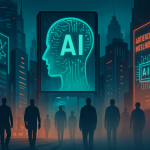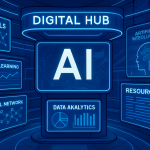The AI world is a chess game played at warp speed, and today’s move involves a familiar face taking center stage once more. Ilya Sutskever, the man who once held the reins as OpenAI’s chief scientist, is now stepping up to lead Safe Superintelligence (SSI), the AI startup he founded with a laser focus on, well, safe superintelligence. This follows the departure of SSI’s CEO, Daniel Gross, who’s been lured away by the siren song of Meta Platforms.
Think of it as the tech world’s version of a Shakespearean drama, but instead of dueling with swords, they’re battling with algorithms and billions of dollars. Gross’s move to Meta isn’t just a career change; it’s a stark reminder of the relentless talent war raging within the AI industry, a war where companies are willing to pay top dollar for the minds that can unlock the next level of artificial intelligence.
Let’s rewind a bit. SSI, the brainchild of Sutskever, emerged onto the scene in 2024 with a clear and ambitious mission: to build AI systems that aren’t just powerful, but also aligned with human values. They secured a cool $1 billion in funding to pursue this goal, a testament to the growing concern surrounding the potential risks of unchecked AI development. Sutskever’s departure from OpenAI, after the whirlwind of the Sam Altman firing and rehiring saga in 2023, was a major turning point. It signaled a divergence in vision, a feeling that perhaps the race for rapid AI advancement was overshadowing the crucial need for safety protocols.
Daniel Gross, the outgoing CEO, is no slouch himself. Before joining SSI, he co-founded the venture capital firm NFDG and even had a stint at Apple after they acquired his startup, Cue, back in 2013. His move to Meta, where he’ll be spearheading their AI product initiatives, speaks volumes about Meta’s commitment to becoming a major player in the AI arena. It’s like watching Iron Man switch sides and join forces with… well, maybe not a villain, but definitely a rival tech giant.
The details of the leadership change are fascinating. Apparently, Meta wasn’t just interested in Gross; they reportedly made a play to acquire SSI outright. But Sutskever, ever the stalwart defender of his vision, turned them down. He’s doubling down on SSI’s independence, vowing to stay true to its mission of developing safe superintelligence, even amidst the allure of big tech riches. It’s a bold move, reminiscent of a David standing firm against a Goliath armed with deep pockets and endless resources.
What does this all mean for the industry? It’s a neon sign pointing to the intensifying competition for AI talent. Meta’s recruitment of Gross, coupled with their establishment of Meta Superintelligence Labs (led by Alexandr Wang and Nat Friedman), is a clear declaration of war. They’re not just dabbling in AI; they’re going all in. Remember that massive $14.3 billion investment Meta made in Scale AI? That wasn’t just pocket change; it was a strategic maneuver to secure a critical advantage in the AI race.
And Meta isn’t alone. Microsoft is developing its own in-house AI models, aiming to reduce its dependence on external partners (read: OpenAI). Amazon’s AWS is also getting in on the action, forming new groups dedicated to agentic AI, which is basically AI that can act autonomously to achieve specific goals. The entire tech landscape is transforming, with each company vying for a piece of the AI pie.
But beneath the surface of corporate maneuvering and technological advancements lies a deeper question: what does “safe superintelligence” actually mean? It’s a term that gets thrown around a lot, but its implications are profound. Are we talking about AI that is simply less likely to malfunction, or are we talking about AI that is fundamentally aligned with human values, even if those values are complex and contradictory? Sutskever’s return to the helm of SSI suggests a renewed focus on these ethical considerations, a commitment to ensuring that AI remains a tool for human progress, not a threat to our existence.
The financial implications are also significant. The AI industry is already a multi-billion dollar market, and it’s only going to get bigger. The companies that can attract and retain top AI talent will be the ones that thrive, while those that fall behind risk becoming obsolete. This talent war is driving up salaries and valuations, creating a hyper-competitive environment where only the most innovative and well-funded companies can survive. Think of it as the tech world’s version of the “Hunger Games,” but instead of fighting for survival, they’re fighting for AI supremacy.
And let’s not forget the regulatory landscape. The rapid advancement of AI is forcing governments around the world to grapple with difficult questions about its potential risks and benefits. Just yesterday, a state ban on AI development failed to pass, prompting renewed calls for national AI regulations. This underscores the growing concern that AI could be used for malicious purposes, and the need for safeguards to prevent its misuse. It’s a delicate balancing act, trying to foster innovation while also protecting society from potential harm.
Ultimately, Sutskever’s leadership at SSI represents a pivotal moment in the AI revolution. It’s a reminder that the pursuit of artificial intelligence is not just about technological prowess, but also about ethical responsibility. As we continue to push the boundaries of what’s possible, we must also ensure that we’re building AI that is safe, aligned with human values, and beneficial to society as a whole. The future of humanity may very well depend on it.
Discover more from Just Buzz
Subscribe to get the latest posts sent to your email.


